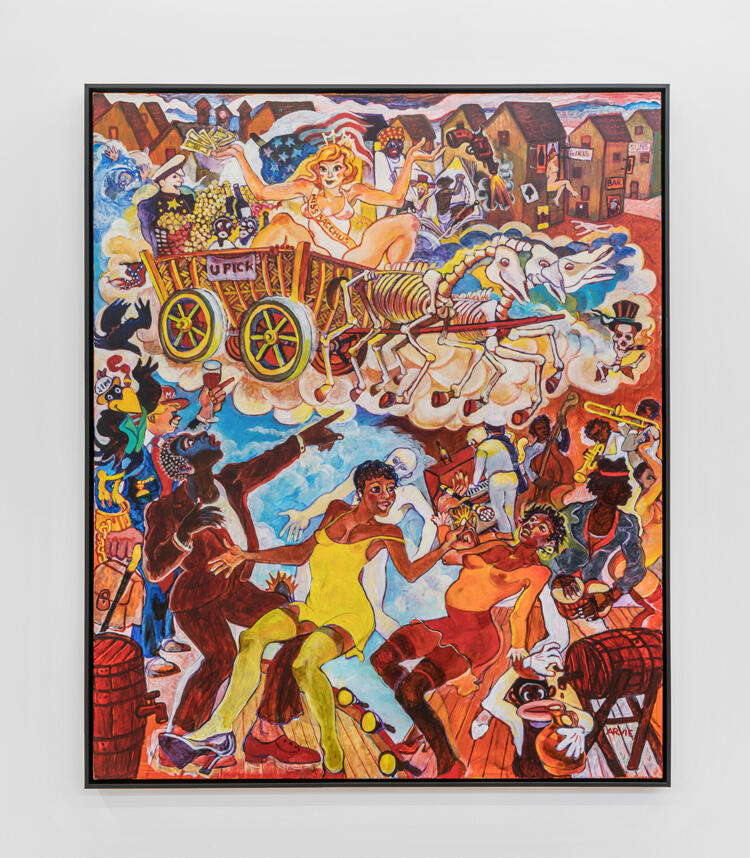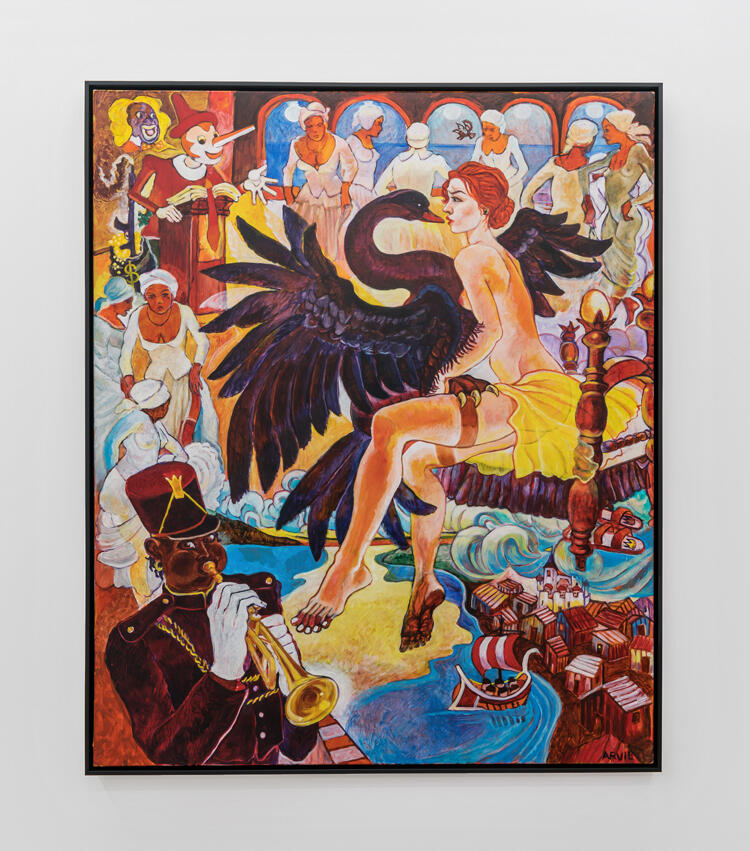Call and Response: Arvie Smith Talks Trash
At Monique Meloche, Chicago, the artist subverts the worst of American racial stereotyping in briskly emotive figurative paintings
At Monique Meloche, Chicago, the artist subverts the worst of American racial stereotyping in briskly emotive figurative paintings

If the mammy, the sambo, the picaninny — indeed, the whole rotten army of stereotypes that whiteness invented to belittle Blackness — represent some of the filthiest trash America’s dreamed up, then ‘Arvie Smith: Call and Response’, now on view at Monique Meloche in Chicago, acts as a gorgeous garbage dump for it. There are slave masters and hypocrite-priests, swastikas and confederate flags, and somewhere near the centre of almost all of these paintings are the slave ships that started it all. A few even include what look like white performers in blackface, though, really, it’s all a form of white caricature in one way or another.

The stink of these stereotypes never really goes away, but there’s unmistakable triumph in the painter’s refusal to let trash just sit there. Born in the Jim Crow South, educated under the abstract expressionist painter Grace Hartigan at the Maryland Institute College of Art, and now, in his 80s, doing some of his finest work, Smith finds ways of drinking down the glut of racism without drowning in it. These are fast images, full of foreshortened comic-book diagonals and pigment streaked thin. Your gaze shoots across the canvas, registering the various monstrosities but always also the whoosh of Smith’s visual sense: the muscular intelligence it took to squeeze so much into one rectangle. Among their many distinctions, these are the first paintings I’m aware of to solve the great problem of political art in the US following the election of former president Donald Trump in 2016: Smith ridicules Trump without paying him the accidental compliment of centrality; here, he’s a clown surrounded by other clowns.

POTUS 45 can be seen in the upper-right corner of Fact Checker (2019), one of nine bright, largeish oil paintings in the show. He’s perched on the kind of metal swing you’d find in birdcages (because he’s a parrot for Russian President Vladimir Putin?), wearing what looks like a dunce’s cap. As satire goes, it’s not the wittiest but, then, neither are the bathroom jokes from Pieter Bruegel the Elder’s catalogue of human folly, Netherlandish Proverbs (1559). Smith’s style of comedy, like Bruegel’s, works best when he keeps things moving along, glancing over the shoulder at his own sight-gags. When he slows down too much, as in Watermelons, White Women, and Straight Razors (2022), things feel uncharacteristically slack. But in Bacchus (2022), his take on a Mardi Gras parade, the artist achieves something akin to perfect lift-off. The eyeball-scorching colours and spiky shapes flow together: a shining gold chariot pulled by skeleton-horses rides past a nutjob in a red MAGA hat, a row of slums marked with an ace of spades (an offensive association that is beginning to be reclaimed), a gun …

I could keep listing things, but Bacchus adds up to more than the sum of its mini-absurdities or the big, mirthless joke of the colour line. And, often, it’s colour that holds Smith’s work in one piece. His browns and blacks contain multitudes, most ingeniously in Leda and the Swan (2022). Here, the Greek myth that sees the god Zeus seduce the Spartan queen disguised as a swan is Americanized to suggest white phobia of Black rape. (A moral panic widely evidenced in US culture from the 1915 film The Birth of a Nation to the infamous ‘Willie Horton’ attack ad during the 1988 presidential campaign.) Smith gives the swan a shimmery eggplant shade that seems to echo details from every part of the painting: Leda’s red hair, a trumpeter’s maroon uniform, the bright blue of the ocean. Greek and American lore merge; unlike colours melt into a rich, fertile darkness. The history and legacy of racial segregation may be Smith’s principal subject, but his paintings are triumphs of the art of mixing.
Arvie Smith, ‘Call and Response’, is on view at Monique Meloche, Chicago, until 5 November.
Main image: Arvie Smith, ‘Call and Response’, 2022, installation view
























